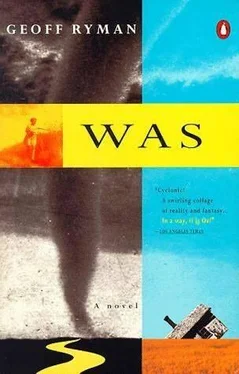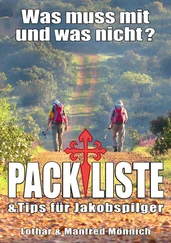The terrible, incomprehensible truth was this: that delight was commonplace in Kansas. Delight in summer, in being young, in being with friends; delight in the warm nights that came between storms, droughts, locusts and disease. Delight in simple games, in cards held out in concealing fans; delight in the river while floating in candlelit canoes. Delight in the broad shoulders and handsome faces of German immigrant farmers with ice-blue eyes; delight in the Kansas damsels with their tough, wry smiles.
Dorothy would hide in the corn and see the awkwardly growing children of Kansas walking out together in pairs, the beefy young men in bunched-up, ill-fitting suits walking chastely beside tall slim girls in long swirling dresses.
The sight of them devastated Dorothy. It was not jealousy. Dorothy did not believe she deserved someone to walk with and had given up even dreaming of it. What devastated Dorothy was that these young people should have each other and have the light and the games and the music, have the crowded parlors and the hot fudge and names to call out to each other. They had all these things and Dorothy's night as well. They also had the blue stillness, the stars and the moon, the only things that Dorothy had thought were her own.
The realization drove her deeper and later into the night, to even more secret places at even more secret times. She would walk across the fields to Sunflower School. She looked at the trees that children had planted and that had their names. She found her own tree. It had not withered or been cut down. It was growing tall and straight, and its leaves rustled as she drew near, as if to say hello.
Then Dorothy would stand on tiptoe and peer through the windows into the classroom that would be lit with moonlight. Sunflower School became Moonflower School. Shadows of window frames cast by moonlight fell over empty desks. There would be sweeps of erased chalk across the genuine slate of the true blackboard, and there would be the stove, and the glass jars in the inkwells, and the empty pegs on which would be hung the faded bonnets in summer and thick wool coats in winter.
The trees were getting bigger, like the children who had planted them. Most of her schoolmates were already gone, adults like her, and the rooms would be suddenly full of children she didn't know. Not even ghosts.
One night toward the end of that summer, Dorothy stepped out from Sunflower School back onto Rock Spring Lane and looked up its straight length toward her hill.
Dorothy remembered Miss Francis telling them about the Aztecs, the Indians of Mexico who had built such fine, high stone buildings. Dorothy's imagination had been caught, and Miss Francis told her about the pyramids they built, rising up in layers. And Dorothy had walked out and seen the hill. It rose in layers, too, as if someone had cut giant steps out of it. Dorothy had been convinced, had wanted to be convinced, that Indians had built her hill as well, and that they lived inside it, like Aztecs. She did not ask Miss Francis if that were so. She had decided that it was so, and that it was her secret.
Dorothy no longer believed in Indians. Rather, she believed in the hopeless, flat, beardless faces wearing dirty white men's clothes, like her own. Dorothy wore britches and boots like a man.
The hill stayed silent as she walked through the secret places of the night. Dorothy wandered through the orchards of Squire Aiken. She did steal a peach and ate it in starlight. She headed east and then south in a great curve around to Pleasant Valley Cemetery. All the dead were lined up as straight and foursquare as they had been in life. There were no terrors for Dorothy in Pleasant Valley Cemetery. She knew most of the people in it. There was Wilbur and Mrs. Jewell; there were some of the Pillsburys and some of the older McCormacks and Allens. She picked wildflowers in the moonlight and left them on the graves. And walked on. She walked miles. Cemeteries and dark woods were better than her dreams.
And suddenly the road plunged down into a hollow, and Dorothy was at Pillsbury's Crossing.
The first time that Dorothy had gone to the Crossing was with the school, her first year in Kansas. It was America's Centennial, 1876, and she was how old? Six? They had come here to have a picnic.
Dorothy remembered the road, plunging down straight across the river. The river was only inches deep, flowing over a single, huge rock. The children had waded in the water, delighting in the cool shade of the hollow. Dorothy had felt ripples under her feet, in the stone, like the ripples water makes in sand. Was rock sand? It was, in a way. Teacher said so.
Teacher said a glacier had probably left the rock there. She said that a glacier was a river of ice, but that didn't make sense. Dorothy thought that perhaps a glacier was some great animal, carrying stones on its back.
The river swept on, in a huge bend, and suddenly slipped over the edge of the rock in a great horseshoe waterfall. It was confusing, because the water started to flow diagonally across the stone. Suddenly it was pouring over it, right next to the road and in the same direction as the road. The other children had yelled and shouted to each other. Dorothy had not liked the noise or the slashes of sunlight through the leaves. Little Dorothy had hidden under a cleft in the great rock itself, behind the waterfall. She watched the flowing screen of water that concealed her. She had heard Miss Francis shouting her name over and over, but Dorothy was in hiding and it simply had not occurred to her to reply. Gasping in panic, Miss Francis found her. "Dorothy!" she exclaimed. "Why didn't you say something?"
Little Dorothy had not known why and could not explain. The next evening Miss Francis came to call for the first time, to have her first long talk with Emma Gulch about what to do with Dorothy.
Now it was night, and everywhere was a hiding place. Once again, Dorothy walked down the road toward the crossing of the waters.
It was very dark in the hollow, and she could only hear, rather than see, the river. She felt her way down a slope of stone toward the crossing.
And then, it seemed to her, she saw the glacier.
Something was stranded in the shallow, rippling water. It snorted a blast of air like a dragon and tried to raise its great head. It had huge hunched shoulders, and it thrashed in the water, pawing with its front legs, trying to stand, failing to stand.
Dazed with sleeplessness, Dorothy simply stood and watched. She waited until her eyes grew used to the dark, began to see things in the starlight that fell through the leaves.
There was a buffalo. A single buffalo alone. Here in Zeandale? There were no more buffalo in Zeandale. And buffalo moved in herds. They did not live alone.
The beast knew she was there. It held up its head, unmoving and watchful. There was a glint of moonlight on its living eyes and on its tiny horns. Dorothy seemed to feel the strain in its neck muscles. The buffalo snorted again and tried to thrash its way to its feet.
And then, the buffalo lay down its head in the waters of the Crossing.
And Dorothy understood. This was the last buffalo. It had come back home to die. Its home would have been the hills above Zeandale. Now those were pastures for cattle, ringed around with barbed wire.
The buffalo were becoming extinct. Like giant flying lizards, or dodos.
Dorothy could hear its breath, hoarse and panting. The beast was dangerous. Its head was huge and a single convulsion would knock her off her feet or tear her flesh. But Dorothy did not want to leave it. She did not want it to die alone, unnoticed. She did not feel that it wanted to be left alone.
She watched it from the shore, warily. It had stopped thrashing and its giant head lay still in the shallow water. She could feel its life draining away. Dorothy sat down on the stone and unlaced her boots and walked out onto the Crossing, toward the edge of the waterfall.
Читать дальше












